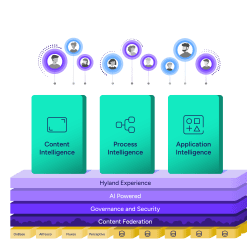Scania
Swedish manufacturer makes it easy for workers around the world to collaborate and exchange knowledge.

Harness the power of a unified content, process and application intelligence platform to unlock the value of enterprise content.
Learn more
Explore Hyland’s solutions by industry, department or the service you need.
Overview of solutionsIt's your unique digital evolution … but you don't have to face it alone. We understand the landscape of your industry and the unique needs of the people you serve.
 Overview of industries
Overview of industries
Countless teams and departments have transformed the way they work in accounting, HR, legal and more with Hyland solutions.
 Overview of departments
Overview of departments
We are committed to helping you maximize your technology investment so you can best serve your customers.
 Overview of services
Overview of services

Discover why Hyland is trusted by thousands of organizations worldwide.
Hear from our customers
Our exclusive partner programs combine our strengths with yours to create better experiences through content services.
Overview of partners
Find resources to power your organization's digital transformation.
Browse the resource center
Hyland connects your content and systems so you can forge stronger connections with the people who matter most.
Learn about HylandWith our modern, open and cloud-native platforms, you can build strong connections and keep evolving.
 Dig deeper
Dig deeper
Reading time minutes
Swedish manufacturer makes it easy for workers around the world to collaborate and exchange knowledge.

One of the world’s leading manufacturers of trucks and buses, as well as industrial and marine engines, Scania operates in more than 100 countries and employs some 41,000 people worldwide.
With research and development activities concentrated in Sweden, the company’s production takes place primarily in Europe and South America, and a network of regional product centers undertake the assembly, body working and fitting-out of locally adapted vehicles.
Local procurement offices in Poland, the Czech Republic, the United States and China supplement the company’s corporate purchasing department in Sweden. In addition, about 20,000 people work in Scania’s independent sales and service organization.
Scania’s identity is shaped by its customers, products and by the people in the company; their values and working methods span three core values — ‘customer first’, ‘respect for the individual’ and ‘quality’. These form the basis of Scania’s culture, leadership and business success.
The ability of co-workers to find and share information and knowledge is central to Scania’s current and future success. Scania believes all its employees are knowledge workers, and is dedicated to creating a learning organization in which people are able to share information and understanding in order to maximize their job satisfaction and create sustainable competitive advantage.
Responsible for a portfolio of services that support Scania’s knowledge workers in going about their daily business, Niclas Lillman, manager of Core Collaboration Services at Scania, outlines the company’s ECM mission.
“We want Scania’s knowledge workers around the world to be able to connect, collaborate and exchange knowledge, using a technology platform that supports document sharing and can incorporate any potential user in the knowledge value chain – including our external suppliers, distributors and dealers.”
An earlier file sharing system implementation had failed to deliver the functionality and ease of use Scania needed to enable its ‘no restrictions’ share and collaborate vision. Keen to eliminate the risk of users turning to non-secure consumer centric sharing services, the hunt was on for a truly world-class collaboration solution.
Lillman outlines the key requirements for Scania’s new enterprise content management (ECM) technology platform. “Based on open standards, it needed to offer a realistic licensing model, deliver an extensive range of functionality and above all, be user friendly,” he explains. “Alongside impressive extensibility, we wanted to be able to integrate the ECM platform into a range of environments, including popular office suites as well as our extranet and intranet.”
Following an extensive evaluation of competing solutions, Hyland's Alfresco platform was selected as the ECM system that delivered the open standards Scania needed to extend knowledge sharing within the enterprise and beyond.
“Many of the competing solutions’ licensing models were highly inflexible and costly. Furthermore, from a technical standpoint, it would have proved challenging, if not impossible, to deploy to external users or customers. This made it incompatible with our long-term knowledge sharing vision.”
In less than four weeks, Scania had successfully implemented the Alfresco platform for 5,000 users, migrating 20,000 documents from a legacy solution to support its knowledge workers. “We literally ran Alfresco platform right out of the box,” confirms Lillman. “The platform’s innate flexibility meant that, in no time at all, we were able to facilitate organizationwide information sharing via a centralized service that users can use as they see fit.”
Initially, Alfresco platform was made available to targeted groups within Scania’s commercial operations. Anyone is free to create a knowledge-sharing site and start collaborating with others. Today, the platform is powering cross-functional and organizational projects, forums and other knowledge- and best-practice-sharing activities. Site owners decide if their site is open and accessible for everyone or whether participants must apply or be invited to become members.
— Niclas Lillman, Manager of Core Collaboration Services
Today, Alfresco platform makes it possible for 5,000 knowledge workers operating within the wider Scania world to network and share thousands of documents focused information in a fast and efficient manner.
Plans are now underway to extend this collaboration capability to all employees within the Scania group, enabling greater cross-functional cooperation across all employees and also external parties.
“Our role is to act as a facilitator, providing a central service that users can utilize in a way that best fits their own requirements,” continues Lillman. “Quite simply, Alfresco platform acts as the information repository and collaboration tool that works in the background, and users apply their own creativity to create knowledge sharing models that work most efficiently for their needs.”
When it comes to evaluating payback on Scania’s Alfresco platform implementation, Lillman is philosophical about the gains. “Our long-term corporate vision of enhanced collaboration has taken a big step forward — you can’t put a price on that.”